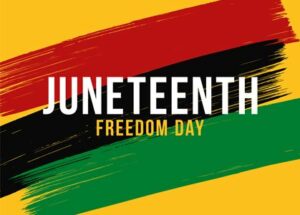
16 June 2023
The summer of 2020 was an inflection point for much of America. The video of the May 25 murder of George Floyd by Minneapolis police officer Derek Chauvin became public. That incident was another marker in a disturbing pattern of police shootings of unarmed African American men and women.
The Floyd murder and the growing Black Lives Matter movement motivated corporations and organizations across America to take action. Cornerstones of Care had already begun taking bold steps to reaffirm principles rooted in 153 years of commitment to provide inclusive and equitable care. As part of its 2020-23 strategic plan, Cornerstones of Care leadership began clarifying its position on diversity, equity, and inclusion (DEI) both internally and externally.
In celebrating Juneteenth, it’s a good time to reflect on Cornerstones of Care’s commitment to DEI. Through a 2022 change in the organization’s paid holiday policy, Juneteenth became one of nine holidays observed by Cornerstones of Care team members.
Juneteenth, observed on June 19, marks the day in 1865 that the order was given to end slavery in Texas, bringing slavery to an end throughout the United States. In June 2021, Juneteenth become a federal holiday to bring sweeping recognition of its historic relevance, invaluable context, and education it affords to remind all Americans of the inherent right of all people to live in freedom today.
“We believe the premise of Juneteenth is vitally important to the hands and heartbeat of our work in support of safe and healthy children and communities, now more than ever,” said Cornerstones of Care President and CEO Merideth Rose. “We believe the celebration of Juneteenth represents more than a day off, but a daily commitment to ensure every child and family we serve will experience one of the most important freedoms of all – to be safe and healthy.”
As Chad Harris summarized in the organization’s DEI work to date: “In 2020, Cornerstones of Care launched its welcoming, inclusive, diverse, and equitable (WIDE) Initiative in recognizing its critical role in addressing historic inequities within the child welfare sector. The board’s decision to amplify existing DEI commitments and give them a renewed focus proved prescient in a year that turned out to be a watershed moment for race relations and social justice in the country.”
Leaders formed the WIDE Committee, conducted a team member culture climate survey, and a client and stakeholder experience survey. Cornerstones of Care provided foundational training for managers, senior leaders, executive leaders, and board members. The first year of the WIDE Committee’s work culminated in finalizing a diversity statement and began sharing it with stakeholders.
As the WIDE Committee made progress on developing an overt DEI process, it became clear that outside support would be beneficial. At the beginning of this year, Cornerstones of Care engaged social impact firm Lexicon Strategies to help the WIDE Committee expand its work, including training, community engagement, and board development.
 That expansion includes raising awareness of child welfare disparities. Over this Juneteenth weekend, several team members will staff a table on Saturday, June 17, at the Juneteenth Heritage Festival in the 18th and Vine District. Those volunteers will share with festival attendees the need for more African American foster parents to provide a cultural connection and affirming home. Black children in metropolitan Kansas City comprise 17 percent of the child population yet are 34.5 percent of the area’s foster care population.
That expansion includes raising awareness of child welfare disparities. Over this Juneteenth weekend, several team members will staff a table on Saturday, June 17, at the Juneteenth Heritage Festival in the 18th and Vine District. Those volunteers will share with festival attendees the need for more African American foster parents to provide a cultural connection and affirming home. Black children in metropolitan Kansas City comprise 17 percent of the child population yet are 34.5 percent of the area’s foster care population.
The disparity, which is consistent with national statistics, is complex and challenging. Cornerstones of Care is participating in a pilot program in Wyandotte and Saline counties in Kansas, called Parent Youth Facilitation, designed to keep youth, including youth of color, out of the foster care system.
While it’s crucial to identify and resolve the disparity of children of color in foster care, it’s also important that these children have a caring adult in their lives as foster children. Cornerstones of Care has created the Foster Diversity campaign to encourage people of color to become foster parents.
If you’d like to learn more about becoming a foster parent, you can start with our Become a Foster Parent 101 video series and fill out an interest form to talk with us about the foster care process. Helping a child work through trauma by being a caring adult when they most need one can be a life-changing experience for both the child and the foster family.
“Like our organization’s courageous posture to honor Juneteenth and recognize the painful period of enslavement the observation represents, we equally lean into the hope and healing that ‘Freedom Day’ symbolizes,” said Merideth. “While stories of trauma represent the diverse, complex, and challenging pieces of a person’s lived experience, we believe a courageous approach to trauma-informed care gives way to a pathway filled with healing, resilience, and hope.”